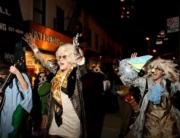Spring break is considered a rite of passage for many, but Liberated: The New Sexual Revolution depicts it as ground zero for raging hormones and bad behavior. This would-be exposé of a documentary kicks off with footage of half-dressed youths drinking heavily on sunlit beaches and dancing frenetically in neon-lit nightclubs at night. The opening also features a narrator pontificating on the struggle for identity that all young people experience; the hard partying initially comes across as an attempt to escape from that.
But Liberated also aims to be a social critique, tying its bacchanalian revelry to a pop culture that is constantly bombarding young people with sexually provocative imagery while simultaneously downplaying the emotional component of sex. According to interviewees, this has led to the normalizing of “hookup culture,” or sex without intimacy, which director Benjamin Nolot investigates by interviewing and hanging out with multiple groups of college students on spring break in Panama City, Florida.
Here the men are on the prowl, and the women are very much aware that sex with no strings is what’s wanted from them. The film delves into the societal forces that have divided the genders into these uneasy camps. On the male front are experts, including a one-time NFL quarterback, who blame movies, videogames, and pornography for convincing young males that exerting power and being in control of their surroundings defines them as men. That concept has evolved into trying to sleep with as many women as possible, and we see such impulses in the form of incessant pickup attempts.
Meanwhile, authors with feminist literature credentials point their finger at a culture that tells women sexuality and femininity are synonymous and getting the attention of men by dressing and acting in a certain way is an aspiring goal. For the film’s two main female protagonists, students from California, the tension between expressing sexuality on their own terms, versus being coerced, is a problem they constantly face.
Nolot takes a largely didactic approach to the issue of how often men and women choose to engage in the aforementioned behaviors. However, the main problem is the superior attitude of the filmmaker, who during interviews asks his subjects questions along the lines of whether they believe in love or long-term relationships. When the answer is negative, it’s framed as a moral crisis, when in fact it hardly seems unusual for early twenty-somethings to have complicated or conflicted feelings about such topics.
The director also devotes much of the screen time to protagonists who exhibit the most extreme behavior, including one male student from Milwaukee who is jaw-droppingly misogynistic and superficial, but he’s hooking up with women left and right. Even the two aforementioned Californians, who are the only women Nolot spends a significant amount of time on, have dramatic arcs that center on participating in a bikini dancing contest. From watching this film, one would assume that every person who goes on spring break is a severe horndog or exhibitionist, but are they in fact the norm or is this just the impression Nolot seeks to convey?
If I had to guess, I would say the film is intended to reassure those who don’t engage in casual sex and excessively binge drinking that they have made the right life choices. At a certain point, Liberated devolves into a lengthy montage of men pawing and trying to undress women without their consent, or behaving even worse. Yet what’s fascinating is that as much as Nolot condemns what he sees, it’s clear that he is simultaneously drawn to it. Indeed, there’s a scene in which his camera actually peeks through the window of a hotel room to try and catch a couple having sex.
Also, as much as the experts harp on the idea that young people fail to appreciate each other’s depths, the director himself is guilty of those same offenses. In following around the Milwaukee-based alpha male, there is a point at which he is left behind with some betas, who unexpectedly let their guards down and start discussing how their own initial sexual experiences were rife with anxiety and emotional pain. It’s a scene that transcends the rest of the film. These aspiring libertines become real people before our eyes! But Nolot seems to have little interest in these young men, almost immediately abandoning them.
Instead, his film comes across like a memory of spring break itself, replete with bare skin and questionable decision-making, but in hindsight, not particularly compelling.







Leave A Comment